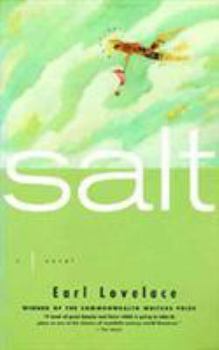Salt
Select Format
Select Condition 
Book Overview
One hundred years after Emancipation, the diverse people of Trinidad--African, Asian, and European--have not settled into the New World. In Salt, an unforgettable cast of men and women strive with wit and passion to make sense of life in an evolving homeland.
Format:Paperback
Language:English
ISBN:0892552352
ISBN13:9780892552351
Release Date:September 2004
Publisher:Persea Books
Length:272 Pages
Weight:0.05 lbs.
Dimensions:0.6" x 5.2" x 8.2"
Customer Reviews
2 ratings
My Students Love This Book
Published by Thriftbooks.com User , 16 years ago
I use Earl Lovelace's novel "Salt" in a course I teach on the African Diaspora at UC-Santa Cruz. Several years after taking this course, former students write me that this is one of the books that has changed their lives. The book is ostensibly about slavery and its aftermath in postcolonial Trinidad. However, it is one of those novels that quickly forces the reader to look in the mirror and ask some fundamental questions including: "What is my relationship to slavery, colonialism, and freedom?" Reminiscent of August Wilson: "Is it possible to live a life of dignity by ignoring the past?" Salt is also outstanding in its efforts to explore the complex relations between peoples of African and Asian descent in Trinidad and the Western Hemisphere. Lovelace wants the reader to have a clear sense that the peoples of Indian Diaspora have been an integral part of the Caribbean. The character Sonan's remarkable grandfather Moon Lochan was the first person in his Indian family to run for elected office against a majority African political party. (During colonialism, Trinidadians were "allowed" to pick a few elected officials to represent them in the colonial council. However, the governor had veto power over all decisions and most "representatives" in the council were actually hand-picked by the British.) Moon and his wife Dularie build the family business over the next several decades after the family had arrived as indentured laborers sometime in the 19th century. (Lovelace is deliciously vague on these details.) There are many more dimensions to this wonderful novel. The reader will find one of the most astute considerations of male/female relationships in recent literary history. Lovelace is clear: true emancipation will not occur unless the relationships between men and women become fully equal. All and all, a brilliant novel of the African Diaspora.
Salt is a rich, lyrical multi-storied novel of the Caribbean
Published by Thriftbooks.com User , 27 years ago
The novel Salt (Faber 1996) has won the 1997 Commonwealth Writer's Prize which probably comes as no surprise to the Caribbean reader, for Earl Lovelace is a highly acclaimed and tried writer from Trinidad. He is noted for a profoundly lyrical and ecstatic style which imbues the ordinary with the magic of hope. Ensconsed in the landscape of the island, the novel Salt weaves the stories of some familiar characters like Miss Myrtle and Bango with some new and yet untold stories, particularly those of Caribbean politicians hailing from a rainbow of ethnic backgrounds. These men have been given a mandate after independence to change the social structure of the island, but are shown to be ineffectual, bombastic, idealistic, confused. Lovelace' touch is as usual however compassionate. He is deeply insightful of the misfit between the aspirations of political figures and the resources of the island, which are rooted in his narrative with a connection to Africa. This is embodied in the figure of an old stickfighter Bango who knows and tells the stories of the island, but who is also shown to point a way forward with his annual multi-ethnic parade of children. Bango carries the weight of the island's past with a conviction of his own belief in the value of a community of feeling, which makes the politician's plans all the more heavy, foreign, absurd, misguided. And so, contrasting village folk with the urban politician, a characteristic distinction made in Caribbean and African literature, Lovelace writes urgently of the need to recover the past in a way which can fill the present more meaningfully, to erase the loss which came with the forced movement of peoples across the Atlantic, to even come to re-remember that there has been that loss. This central narrative is spun around another one of the relationship between women and men, and between mothers and sons. The men appear in the active dreams of the women, especially the single women. Yet the women in the everyday world are seen to support, advise, guide the men. The mutualities within these relationships as evoked in Salt is perhaps not politically correct yet is conveyed as a reality nevertheless. It is hard to capture in this short review the depth of feeling that Lovelace brings to these characters, in their small actions, their few words, and their large as life troubles. This book is therefore highly recommended to those interested in new literature of change, protest, and celebration





